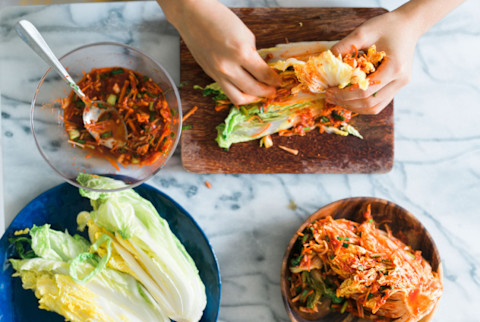This Is The Only Diet That's Healthy For Everyone, According To An Integrative Gastroenterologist

What diet do you follow? Paleo? Vegan? Mediterranean? Ketogenic? Or maybe somewhere in between? As an integrative gastroenterologist, one of the most frequently asked questions I get in my office is "So what should I eat?" And seeing as I'm an expert in all things digestion and gut health, you would think that the answer would be easy to give. Well, it is and it isn't.
We generally know which foods are healthy and which ones aren't. For example, processed foods, trans fats, sodas, fast foods, sugar, and genetically modified foods are at the top of the list of things to avoid1. Meanwhile, a wide array of colorful, organic vegetables and fruits, healthy fat sources such as olive oil and omega-3s, and immune-boosting herbs and spices are generally considered healthy. However, it is nearly impossible to guess exactly what diet an individual should eat.
There is a reason, however, why so many different diets are successful at making people healthier. The common threads among all of the main popular diets are quite similar. You're supposed to get rid of the bad stuff and focus on the good stuff. But then why do some people not improve, even when they eat the good stuff and get rid of all the bad stuff? The benefits and pitfalls of all these popular diets have everything to do with one thing: the microbiome. And this is exactly why we must all follow the microbiome diet, first and foremost.
Why we should all be eating a microbiome diet.
First, let's briefly talk about the microbiome. The gut microbiome refers to the trillions of bacteria that live within our gastrointestinal tracts. If you were to collectively bunch them all up into a ball, it would weigh anywhere from 3 to 5 pounds, as much as the human brain! These bacteria, viruses, and fungi do a lot of things, including helping us digest our foods and making vitamins and nutrients2 for us. Human beings are only about 10 percent similar in their microbiomes, so these organisms are what make us so unique—and a good clue as to why the same diet doesn't work for everyone.
It doesn't end with our gut: We also have a skin microbiome, an oral microbiome, a vaginal microbiome, and many more. All these organisms live in and on us, and, for the most part, they are there to help us out. However, sometimes they get out of balance and we end up getting sick as a result. The key to maintaining a harmonious microbiome3 (and good health) is doing all the things that support the good bugs and less of what helps the bad bugs flourish. The more diverse and rich your gut microbiome is, the more resilient you will be.
How to develop a diverse microbiome for optimal health.
The way we develop a diverse microbiome is by eating a wide variety of healthy foods, such as leafy greens, cruciferous vegetables, fermented foods (such as sauerkraut, pickles, kimchi, miso, kombucha), organic meats (if you choose to eat meat), nuts, whole grains, teas, coffee, spices, and herbs—I think you get the point. You've probably heard this before. But the key question is: Which vegetables, which herbs, and which spices will be best for your microbiome?
If we knew exactly what kinds of microorganisms we had within us, we could figure out what foods to feed the good guys so that they will prosper; because if they prosper, we prosper. It's sort of like having 10 toddlers over at your house for a play date and each one of them likes a different thing. The same concept applies to the microbes living in our gut. The microbiome diet is a specific diet for your specific gut bugs, and, luckily, there are now tests that can analyze your microbiome. With the amazing advances we have made in science and technology4, we are now able to help you figure out exactly what you should eat, not what you "probably" should eat.
The technology we have access to right now is revolutionizing the way we practice medicine and health care in general. And it's only going to make the microbiome diet more and more effective at keeping us healthy. This has made my job as a physician so much more rewarding. Being able to teach people about the microbiome and its powers, and then guiding them through the steps it takes to cultivate their own inner garden has helped me reverse conditions5 like obesity, autoimmune disease6, eczema, depression, anxiety, chronic constipation, chronic diarrhea, fatty liver, high cholesterol, high blood pressure, and diabetes, to name a few. Without a doubt, there is only one diet that is helpful for everyone—and that is the microbiome diet.
